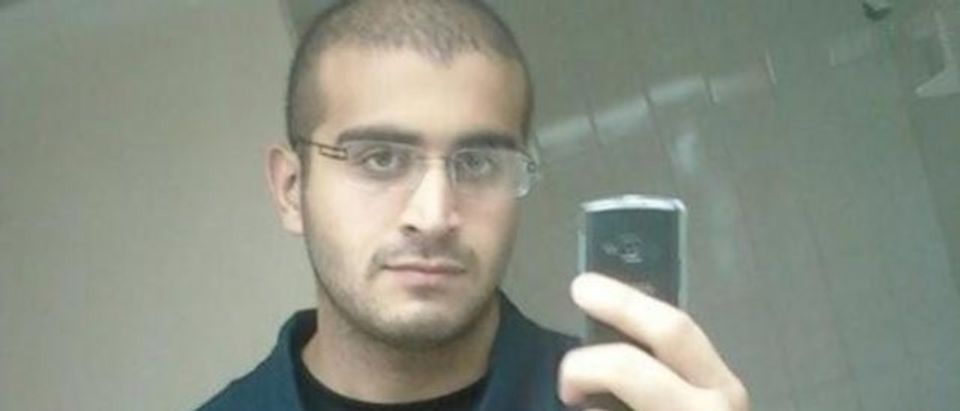Fifteen years after the 9/11 attacks, how could the Orlando massacre be possible? September 11 was supposed to be our wakeup call. The United States erected a vast domestic and international security structure so that we could remain vigilant, so that we would be secure.
Some say we went too far, that we gave too much power to the government. But if we have the kind of intrusive surveillance state that Edward Snowden and others say reaches far beyond what is necessary for our basic security, how did it overlook Orlando terrorist and ISIS hero Omar Mateen?
Often in these cases we hear, after the fact, that the attacker was a good neighbor or coworker, generally friendly, exhibiting no signs of extremist behavior. No one would have any reason to suspect he or she would one day snap, shout “Allahu Akbar!” and start killing innocent people.
But not Omar Mateen. The man was a walking disaster. Mateen threw up more red flags than a May Day parade.
Daniel Gilroy, Mateen’s former co-worker at G4S Secure Solutions, said that he had “issues and just constant anger,” loudly used racial, ethnic and sexual slurs, and “talked about killing people all the time.” Mr. Gilroy tried to bring this behavior to the attention of the company before Mateen hounded him out of the job. For its part, G4S subjected Mateen to two background checks and found no cause for concern.
Mateen’s ex-wife Sitora Yusifiy said he was “mentally unstable and mentally ill,” a bipolar, steroid-using spousal abuser.
Mateen’s father is a prominent Afghan refugee and alleged Taliban sympathizer with delusions of grandeur who thinks he is president of Afghanistan.
Mateen openly espoused his radical political views, and traveled to the Middle East at least twice. He said he was loyal to ISIS, and the Islamic State claimed him as one of their own. Mateen got an early start on radicalism, celebrating the 9/11 attacks when he was in high school, and mimicking being an airplane crashing into buildings. And he boasted falsely about knowing the 2013 Boston bombers Dzhokhar and Tamerlan Tsarnaev, whom he called his “homeboys.”
FBI director James Comey said Mateen exhibited “strong indications of radicalization.” The Bureau had interviewed him twice before but had insufficient evidence of wrongdoing to pursue him further. The FBI does the best it can with its limited resources, and under constant White House political pressure to ease up on investigating Muslims. It could be career suicide for an agent to focus too closely on someone like Mateen.
Case in point: Mateen worshipped at the Islamic Center of Fort Pierce, Florida, which has ties to extremist-linked organizations. However, a Department of Homeland Security investigation into this network was shut down in 2012 by the Clinton State Department and the DHS’s Civil Rights and Civil Liberties Office because “the Obama administration believed it unfairly singled out Muslims.” Records of the investigation were later deleted.
This points to why Mateen was not corralled before he could carry out his attack. As a young, religiously motivated Muslim man, he fit the profile too well. The United States has unilaterally disarmed against the domestic Islamist threat. It is the result of years of flawed policies aimed less at securing America than at inculcating a national sense of shame for alleged crimes against Muslims. The dynamic was illustrated dramatically in the wake of the December 2015 San Bernardino massacre, when Attorney General Loretta Lynch said she would prosecute those who criticized Islam too vigorously. The message from the White House is, if you see something, don’t say something unless you want to be called an Islamophobe.
The heroes – in addition to the police officers who took the shooter down – were the employees at the unnamed shop who refused to sell Mateen advanced Level III body armor that would have prolonged the gun fight and may have resulted in many more deaths. Imagine the media storm Mateen could have generated if he had made an issue out of being denied a purchase “simply for being a Muslim.” Or maybe it was that he came off as emotionally unbalanced, toxic and potentially violent, which was the impression most people had of him.
If someone as obviously a problem as Omar Mateen could not be stopped before committing a mass casualty terror attack, who can? The Orlando massacre sends a message to Islamist terrorists that it is open season in America. But they already know that.
James S. Robbins is a USA Today columnist and author of Native Americans: Patriotism, Exceptionalism and the New American Identity.


